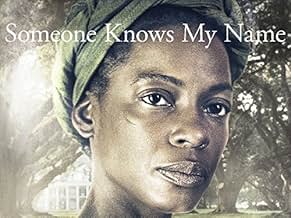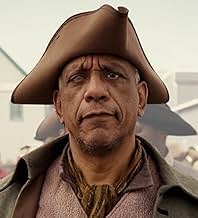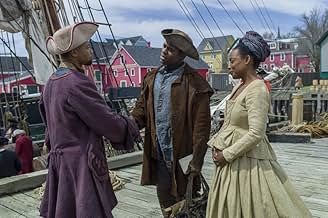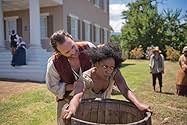The Book of Negroes
- Miniserie de TV
- 2015
- 44min
CALIFICACIÓN DE IMDb
7.8/10
2.5 k
TU CALIFICACIÓN
Secuestrada en África y posteriormente esclavizada, Aminata debe sortear una revolución en Nueva York, el aislamiento en Nueva Escocia y las selvas de Sierra Leona, en un intento por consegu... Leer todoSecuestrada en África y posteriormente esclavizada, Aminata debe sortear una revolución en Nueva York, el aislamiento en Nueva Escocia y las selvas de Sierra Leona, en un intento por conseguir su libertad en el siglo XVIII.Secuestrada en África y posteriormente esclavizada, Aminata debe sortear una revolución en Nueva York, el aislamiento en Nueva Escocia y las selvas de Sierra Leona, en un intento por conseguir su libertad en el siglo XVIII.
- Premios
- 19 premios ganados y 26 nominaciones en total
Explorar episodios
Opiniones destacadas
I thought I had found the wrong series when first I saw lead actor Aunjanue Ellis on the DVD jacket-cover with a modern look (including makeup). A far cry from the book's original cover that included a modest, much darker-skinned woman whose look was to reflect that of being enslaved most of her life.
But that's just the start of my experience with this series.
I had read and enjoyed every gritty details of the book, simply because it was raw and heart-breaking, meant to make the reader feel something beyond their grasp. All of the ugly elements and consequences of rape, humiliation, personal loss, just to name a few things that rob someone of their dignity. The series seemed to cater to the ever-sensitive TV viewers who very likely needed to see slaves fully-clothed, clear-skinned, and bright-eyed. The series left out shocking details from the book, such as the infants that were thrown overboard (alive) on the first ship to the Americas. Once again, TV & Film find it too easy to spoon-feed the viewer only as much as they need to.
This series consisted of six episodes. Surely they had some time to show a few shocking moments from the book.
What's more, the very obvious sexual tension between Aminata and Sam seemed to be added for the viewers' pleasure since an absent husband just isn't as romantic.
These details that the readers of the book know about that the viewing audience doesn't makes me wonder if there ever will be a bridge between literature and screen-writing, as we see it time and time again.
I realize that this work is meant to be separate, and that Lawrence Hill did not write the screenplay, but I can't help but wonder why it is so necessary to take a subject as serious as this, during times like we are in now, and water it down with so much Hollywoodism.
My answer for those who read the book and wonder if they'll also enjoy the series?: No. I did give it two stars simply because I did enjoy the cast and for what it's worth, they did a good job. The costuming, cinematography, sound.. all of it good, but just a disappointment when you know how the story goes and end up with so much less than you hoped.
But that's just the start of my experience with this series.
I had read and enjoyed every gritty details of the book, simply because it was raw and heart-breaking, meant to make the reader feel something beyond their grasp. All of the ugly elements and consequences of rape, humiliation, personal loss, just to name a few things that rob someone of their dignity. The series seemed to cater to the ever-sensitive TV viewers who very likely needed to see slaves fully-clothed, clear-skinned, and bright-eyed. The series left out shocking details from the book, such as the infants that were thrown overboard (alive) on the first ship to the Americas. Once again, TV & Film find it too easy to spoon-feed the viewer only as much as they need to.
This series consisted of six episodes. Surely they had some time to show a few shocking moments from the book.
What's more, the very obvious sexual tension between Aminata and Sam seemed to be added for the viewers' pleasure since an absent husband just isn't as romantic.
These details that the readers of the book know about that the viewing audience doesn't makes me wonder if there ever will be a bridge between literature and screen-writing, as we see it time and time again.
I realize that this work is meant to be separate, and that Lawrence Hill did not write the screenplay, but I can't help but wonder why it is so necessary to take a subject as serious as this, during times like we are in now, and water it down with so much Hollywoodism.
My answer for those who read the book and wonder if they'll also enjoy the series?: No. I did give it two stars simply because I did enjoy the cast and for what it's worth, they did a good job. The costuming, cinematography, sound.. all of it good, but just a disappointment when you know how the story goes and end up with so much less than you hoped.
Based on a bit of true history and a fictionalized book of the same name, this mini-series yields an aspect of the African slave story that I'd not known about before. Set in the late colonial / post-Revolutionary era, the story fills in some gaps left by Alex Haley's Roots chronicle.
No doubt legitimate criticism could be made of the film regarding its perhaps overly romanticized version of real life for African slaves in the colonies, and the multiple, implausible transatlantic voyages of the main character, and the surprise ending. If you can look past those flaws, the movie holds interest and the principal actors give engaging performances.
Two actual copies of the real Book of Negroes exist -- one in the National Archives in London, the other in National Archives in Washington DC.
No doubt legitimate criticism could be made of the film regarding its perhaps overly romanticized version of real life for African slaves in the colonies, and the multiple, implausible transatlantic voyages of the main character, and the surprise ending. If you can look past those flaws, the movie holds interest and the principal actors give engaging performances.
Two actual copies of the real Book of Negroes exist -- one in the National Archives in London, the other in National Archives in Washington DC.
The Book of Negroes was an eighteenth century British document detailing all the Afro-Americans who had fought on the British side in the Revolutionary war, and were promised a new life elsewhere. A considerable number ended up in Nova Scotia and New Brunswick. There were problems with the harsh climate and petty racism, but it was better than the alternative.
This program takes its name from that, and the first episode looks quite satisfying, as we trace a black girl's odyssey from Mali to America.
So far, it does not seem much different from Roots, but I will keep watching to see if something original turns up.
This program takes its name from that, and the first episode looks quite satisfying, as we trace a black girl's odyssey from Mali to America.
So far, it does not seem much different from Roots, but I will keep watching to see if something original turns up.
Nice enough reenactments of stories and adventures that could or have happened in the slave period of the englishes. Very english point of view with no subtitles english or french. Rather disappointing from the CBC. Saw it on dvd.
Like others have said here, I got a good bit of new information from this series, that I didn't know about before. I've always liked Ms. Ellis, especially in The Mentalist. There was a great deal of subtle artistry in her makeup as she aged. I thought the story flowed very well. But honestly, whoever cut the series should get a new pair of scissors. Maybe the network cut it so sloppily for commercials? It was completely distracting. Other than that, I was fascinated with the set direction, costumes, locations and thought the supporting cast was very good. I'd like to read a bio of Ms. Diallo now. Ridiculous that we have to write ten lines for a review. Blah.
¿Sabías que…?
- TriviaBased on the name of the book that really existed, that had the names of Negroes who served the British during the Civil War, then were freed and sent to Nova Scotia to live. Publishers changed the name of the book from "Book of Negroes" to "Someone Knows My Name" because the term "Negro" has become a derogatory term to many people in the U.S., and sellers were hesitant to sell a book with that word in the title.
Selecciones populares
Inicia sesión para calificar y agrega a la lista de videos para obtener recomendaciones personalizadas
- How many seasons does The Book of Negroes have?Con tecnología de Alexa
Detalles
- Fecha de lanzamiento
- País de origen
- Idioma
- También se conoce como
- Someone Knows My Name
- Locaciones de filmación
- Productoras
- Ver más créditos de la compañía en IMDbPro
Contribuir a esta página
Sugiere una edición o agrega el contenido que falta

































